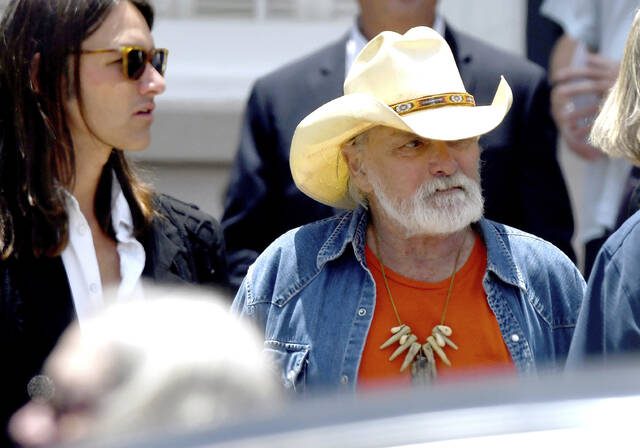Dickey Betts, a renowned guitarist who helped start the Allman Brothers Band and wrote their most popular song, “Ramblin’ Man,” has passed away at the age of 80.
The Rock & Roll Hall of Famer passed away at his residence in Osprey, Florida, as confirmed by David Spero, Betts’ manager for 20 years. Spero mentioned that Betts had been fighting cancer for over a year and was also dealing with chronic obstructive pulmonary disease.
Spero stated over the phone that Betts was in the company of his entire family when he peacefully passed away, and they believe he did not experience any pain.
Betts, alongside Duane Allman, shared guitar responsibilities in the original Allman Brothers Band, contributing to their unique sound and the creation of the Southern rock genre. Many artists, including Lynyrd Skynyrd, Kid Rock, Phish, and Jason Isbell, were influenced by the Allmans’ music, which blended blues, country, R&B, and jazz with ‘60s rock.
Blues-rock guitarist Joe Bonamassa mentioned in an Instagram post that his first concert was Dickey Betts in 1983, indicating that Betts inspired the model of his favorite electric guitar and left a lasting impression on him.
Additional tributes came from members of the Allman Brothers Band’s larger family.
Guitarist Derek Trucks and his wife and bandmate, Susan Tedeschi, posted on their joint Instagram account stating that Betts was “one of best to ever do it.”
Their post concluded with, “Rest easy Dickey.”
Trucks, who joined the Allman Brothers Band in 1999, is the nephew of Butch Trucks, one of the band’s original drummers.
Bassist Berry Duane Oakley, the son of Allman Brothers founding bassist Berry Oakley, paid tribute to his “Uncle Dickey” on Facebook, expressing gratitude for Betts’ impact on his music career and the lasting legacy of his music.
Established in 1969, the Allman Brothers pioneered jam band music by performing lengthy compositions in concerts and on records, deviating from the conventional three-minute pop songs. Additionally, the band was notable for being a biracial group from the Deep South.
After Duane Allman’s passing in a motorcycle accident in 1971, and Oakley’s death in a motorcycle crash a year later, Betts and Gregg Allman, Duane's younger brother, became the leaders of the band. However, they frequently clashed, and substance abuse further complicated their dynamic. The band disbanded on multiple occasions before reuniting and experiencing more than a dozen lineup changes.
The Allman Brothers Band was honored with induction into the Rock & Roll Hall of Fame in 1995 and received a Lifetime Achievement Grammy Award in 2012. Betts parted ways with the group in 2000 and pursued solo projects as well as performing with his band Great Southern, which included his son, guitarist Duane Betts.
Forrest Richard Betts, born on December 12, 1943, grew up in the Bradenton, Florida, area, close to the Highway 41 that he sang about in “Ramblin’ Man.” His family had been residing in the area since the mid-19th century.
Betts was drawn to country, bluegrass, and Western swing from a young age, initially playing the ukulele and banjo before switching his focus to the electric guitar to impress girls. At 16, he ventured out on his first road trip, joining the circus to play in a band.
He came back home, and with bassist Oakley joined a group that later became the band Second Coming from Jacksonville, Florida. One night in 1969 Betts and Oakley jammed with Duane Allman, who was already a successful session musician, and his younger brother, and together they formed the Allman Brothers Band.
The group relocated to Macon, Georgia, and put out a self-titled debut album in 1969. A year later came the album “Idlewild South,” highlighted by Betts’ instrumental composition “In Memory of Elizabeth Reed,” which soon became a concert staple.
The 1971 double album “At Fillmore East,” now considered among the greatest live albums of the classic rock era, was the Allmans’ commercial breakthrough and solidified their performing reputation by showcasing the unique guitar interplay between Allman and Betts. Their styles contrasted, with Allman playing bluesy slide guitar, while Betts’ solos and singing tugged the band toward country. When layered in harmony, their playing was especially distinctive.
The group also had two drummers: “Jaimoe” Johanson, who is Black, and Butch Trucks.
Duane Allman died four days after “Fillmore” was certified as a gold record, but the band carried on and crowds continued to grow. The 1973 album “Brothers and Sisters” rose to No. 1 on the charts and featured “Ramblin’ Man,” with Betts singing the lead and bringing twang to the Top 40. The song reached No. 2 on the singles charts and was kept out of the No. 1 spot by “Half Breed” by Cher, who later married Gregg Allman.
The resounding sound of Betts’ guitar on “Ramblin’ Man” echoed in neighborhood bars around the country for decades, and the song illustrated his talent for melodic hooks. “Ramblin’ Man” was the Allmans’ only Top Ten hit, but Betts’ catchy 7 1/2-minute instrumental composition “Jessica,” recorded in 1972, became an FM radio staple.
Betts also wrote or co-wrote some of the band’s other most-loved songs, including “Blue Sky” and “Southbound.”
Inactive for most of the 1980s, the Allman Brothers Band made a comeback in 1990 with Warren Haynes joining Betts on guitar.
Betts recorded three more studio albums and toured with the band over the next decade, but he had a bitter split from the Allman Brothers in 2000. His bandmates suspended him from their summer tour and issued a statement blaming “creative differences.”
Betts said Gregg Allman and the other members delivered the news in a fax implying he needed treatment for substance abuse. Betts took legal action and settled with the band in arbitration. The breakup was permanent. Gregg Allman and Butch Trucks died in 2017.
After leaving the Allman Brothers, Betts continued to play with his own group and lived in the Bradenton area with his wife, Donna.



